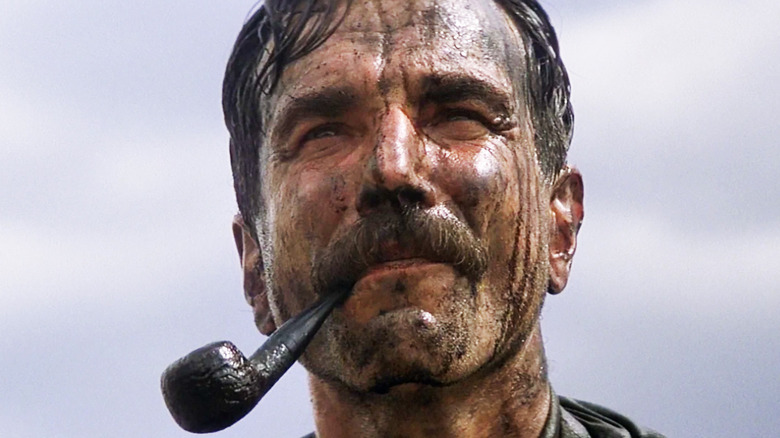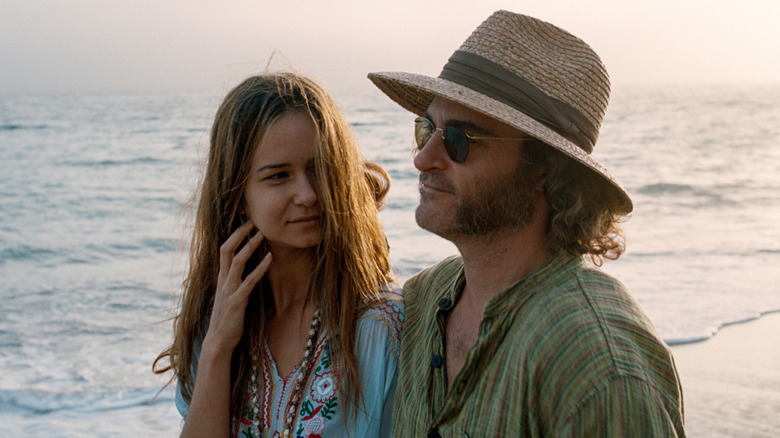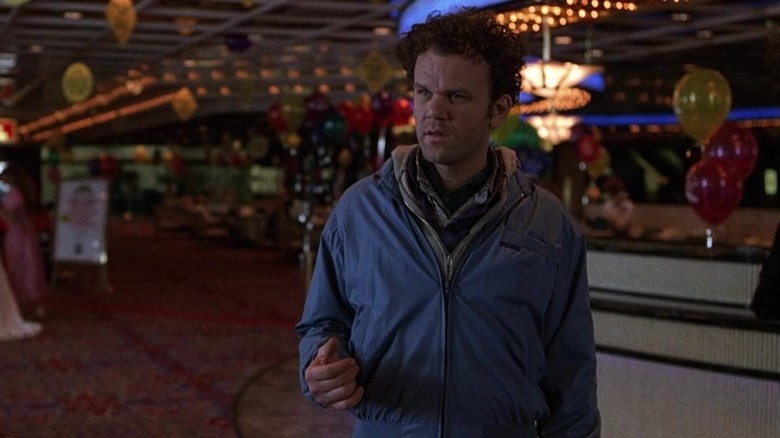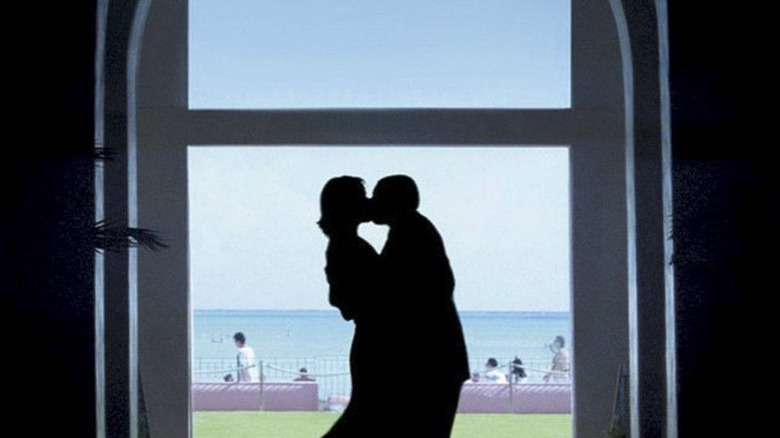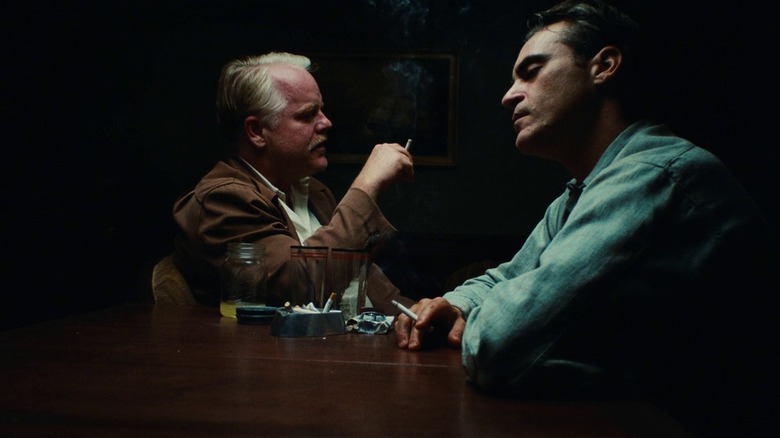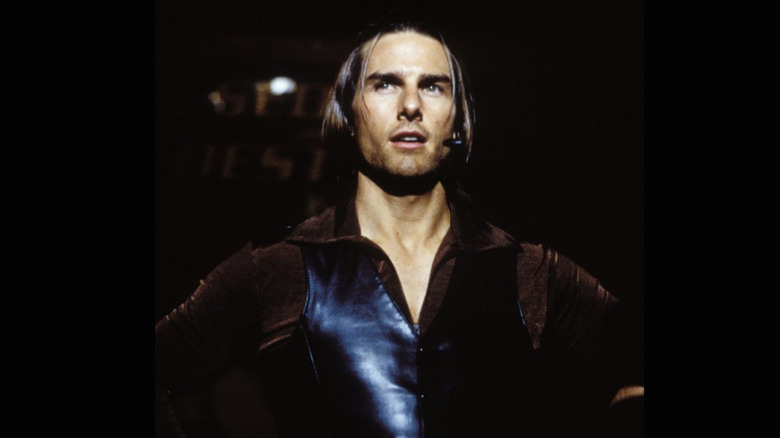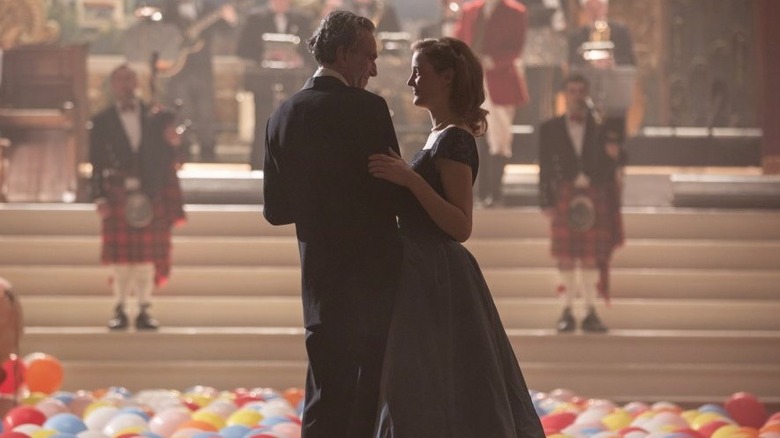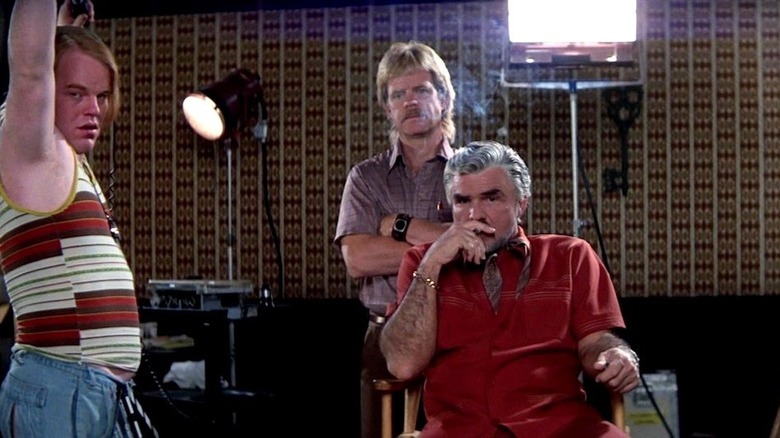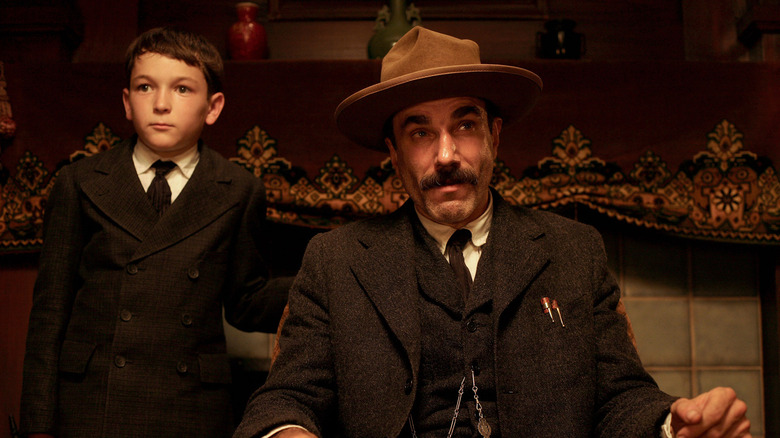All 8 Paul Thomas Anderson Feature Films Ranked Worst To Best
Paul Thomas Anderson is one of the most significant filmmakers of his generation, a director whose name alone is enough to generate anticipation for one of his films. Anderson's movies are characterized by methodical pacing, alienated characters, and striking imagery, and yet he's never been bound to just one genre, tone, or location. His films range from uproariously funny to crushingly emotional. Often, they manage to be both at the same time.
Anderson's newest film, "Soggy Bottom," is a '70s coming-of-age story that stars Bradley Cooper, Cooper Hoffman, Alana Haim, Skyler Gisondo and Benny Safdie. It hits theaters this November, and will almost certainly factor into the upcoming awards race. For Anderson, that's pretty normal. Anderson has been a film geek favorite since his first feature debuted in 1996, and unlike some of his contemporaries, the quality of his work has been quite consistent; the director has yet to helm a film that could be truly considered a failure. Even Anderson's flawed work is at least interesting, which creates a challenge when attempting to rank his filmography.
We're going to try anyway. It might be misleading to call anything from Anderson the "worst," but here are his directorial efforts thus far, ranked from our least to most favorite.
8. Inherent Vice
"Inherent Vice," a sprawling ensemble piece set in the Northern California Valley, seemed like it would be Anderson in his element. The comedic noir tale reunited Anderson with Joaquin Phoenix, who stars as Larry "Doc" Sportello, a perpetually-stoned private investigator who takes on a complicated kidnapping case at the behest of his ex-girlfriend, Shasta Fay Hepworth (Katherine Waterston).
It's by no means a standard noir, as Anderson trades tightly wound tension for a leisurely-paced mystery that plays the convoluted plot for laughs. "Inherent Vice" shares more with hangout classics than traditional neo-noir thrillers. Doc's inability to make progress on the case is hilarious thanks to Phoenix's idiosyncratic performance, and the hapless private eye stumbles onto clues more than he does any actual detective work.
However, the relaxed approach makes "Inherent Vice" the hardest Anderson film to return to. Scenes are stretched to the point of exhaustion, and while the ensemble is populated by standout supporting characters, including Josh Brolin's sensitive police officer Christian F. "Bigfoot" Bjornsen, it's hard to invest in the story when it keeps going on digressions. Some Anderson fans enjoy the relaxed vibe of "Inherent Vice," but the two and a half hours drag. It's not a bad movie, but it's better described as a cult favorite than a legitimate classic.
7. Hard Eight
Anderson's debut, "Hard Eight," is one of his most underrated films. For some filmmakers, a low budget might suggest a less ambitious effort, but Anderson makes intimate settings and barren locales feel like stylistic choices, not limitations.
Phillip Baker Hall stars in "Hard Eight" as Sydney, a veteran gambler who meets a young man in need of help. John C. Reilly's John is mourning his mother, and while he's initially suspicious of the older man's intentions, he agrees to join Sydney on a trip to Las Vegas, where the pair can earn enough to pay for funeral expenses. Sydney teaches John the tricks of the table, but the two are marked for trouble within the competitive Vegas gambling scene.
"Hard Eight" takes an unsentimental look at the duo. Hall is riveting as the experienced Vegas player whose initially warm personality covers up a sordid past. Reilly plays hapless sentimentality brilliantly, and when he figures out Sydney's real motivation, his response is heartbreaking. Standout supporting performances by Samuel L. Jackson as a dangerous security guard and Phillip Seymour Hoffman as a crass craps player add tension, leading to a legitimately jaw-dropping twist in the film's final scene. While not as philosophically stimulating as Anderson's later work, the director's first feature laid a strong foundation for the rest of his career.
6. Punch-Drunk Love
Long before the Safdie Brothers' "Uncut Gems" earned him serious awards buzz, Paul Thomas Anderson proved that Adam Sandler could be a great actor with "Punch-Drunk Love." Sometimes, comedic actors choose deathly serious roles or make extreme physical transformations in order to be taken seriously. Here, though, Sandler is cast as a good-natured man-child in over his head, a role not dissimilar from those he frequently plays. It's Anderson's non-traditional approach to the material, which incorporates strange non sequiturs and philosophical ramblings, that makes "Punch-Drunk Love" different from Sandler's other romantic comedies.
Sandler stars in "Punch-Drunk Love" as Barry Egan, a salesman whose life is dominated by his eccentric sisters and frequent bouts of rage. Unsatisfied with the direction of his career, Barry finds hope when a bizarre car accident inadvertently introduces him to Lena (Emily Watson), his sister's co-worker. Barry quickly becomes infatuated, and attempts to break free of his familial trauma in order to pursue a relationship.
Anderson deconstructs Sandler's on-screen persona by giving reasons for Barry's erratic behavior. While "Punch-Drunk Love" contains many hilarious moments, including the now iconic phone conversation in which Barry is berated by the owner of a phone-sex line (Phillip Seymour Hoffman in a brief, but unforgettable, performance), Sandler is more vulnerable in this film than he's ever been. Anderson is rarely a sentimental filmmaker, but the genuine chemistry between Sandler and Watson make "Punch-Drunk Love" his most charming film to date.
5. 5. The Master
Anderson hasn't tackled a traditional biopic, but "The Master" is loosely based on the life of Scientology founder L. Ron Hubbard, and generated significant controversy. It's also a compelling examination of the seductive power of a charismatic leader who targets troubled young men, and a great showcase for both Joaquin Phoenix and Phillip Seymour Hoffman.
Phoenix stars in "The Master" as Freddie Quell, a World War II veteran haunted by PTSD who becomes acquainted with wealthy community leader Lancaster Dodd (Hoffman). Quell suspects that Dodd's organization, the Cause, may be spreading radical philosophies among its members, but Dodd's charisma and the future he promises slowly draw Freddie into his teachings. All this leads to some of Phoenix and Hoffman's best-ever work, particularly during the scene in which Dodd interrogates Quell in order to test his loyalty. The repetition of questions, Hoffman's dull tone, the dim lighting, and the claustrophobic environment perfectly embody the alienation and isolation the characters feel.
The supporting performances are quite strong, too, particularly Amy Adams as Dodd's wife. Despite her limited screen time, Adams drops tantalizing hints that her character may be the Lady Macbeth of the Cause, yet can't become the public face because of the '50s' restrictive gender roles. Whether "The Master" is watched as a lightly fictionalized historical fable, a surrealist satire, or an erotic love story about two men who are unable to confess their feelings, "The Master" is a film that grows more rewarding with repeated viewings.
4. Magnolia
Each of Anderson's films is highly ambitious, but the unique challenge of making a three-hour ensemble drama could've easily seen Anderson fall victim to indulgence. Despite the movie's epic runtime, its compelling performances leave few dull moments, and Anderson expertly darts in and out of the interconnected storylines to keep the viewer engaged.
Against the backdrop of an unexplainable weather event, a lonely police officer (John C. Reilly) encounters a troubled woman, Claudia (Melora Walters). Claudia's father Jim (Phillip Baker Hall) hosts a twisted game show in which child prodigies are pitted against each other. The show's recurring winner, Stanley (Jeremy Blackman), is emotionally tormented by his father. The game's former champion, Donnie (William H. Macy), works at a desolate day job. The show's former creative executive Earl (Jason Robards) is on his deathbed, where he confesses his regrets to his empathetic caregiver Phil (Phillip Seymour Hoffman). Earl's son Frank (Tom Cruise) is a motivational speaker who preaches toxic masculinity.
Anderson develops each character fully, giving them depth that's not evident when they first appear. Jim suffers from personal trauma. Stanley begins to rebel against the game. Jimmy regrets his life choices. Phil bridges the gap between an estranged father and son, while Tom Cruise brilliantly deconstructs the rage felt by an abandoned child. "Magnolia" is an empathetic character piece that challenges the viewer to not judge its characters based on their first impressions. Beautifully shot by Robert Elswit and featuring terrific original songs from Aimee Mann, "Magnolia" is among Anderson's most emotionally moving films.
3. Phantom Thread
"Phantom Thread" is a period romance for people who can't stand stuffy costume dramas. It's also about a power struggle between two fiercely independent thinkers who simply can't conform to the roles of a creator and his muse. Daniel Day-Lewis stars as Reynolds Woodcock, a reclusive fashion designer whose controlling nature is managed by his sister Cyril (Lesley Manville), until his strict schedule is disrupted by an emotion he's never felt before: love. After he becomes fascinated by his new waitress, Alma (Vicky Kreips), Reynolds recruits the young woman to model his gowns, ultimately falling for her headstrong personality.
Reynolds' inability to separate his art and his desires is both hilarious and tragic. His idiosyncrasies are initially played for laughs, but as "Phantom Thread" goes on, Alma becomes fatigued by Reynolds' rigorous demands. Still, they bond during an entertaining sequence in which Reynolds decides he must take back a dress from a customer he deems unworthy to wear it.
A happy medium does not exist in this relationship, and as they vie for control, Reynolds and Alma are only able to gain momentary leverage over each other. It's a doomed love affair made even more heartbreaking because of the performances; Krieps plays Alma as sweet but not naïve, and despite his commanding nature, Day-Lewis makes the aloof Reynolds relatable. Those fleeting moments when the two are on an equal playing field are joyous, and their separations all too bitter.
2. Boogie Nights
In "Boogie Nights" Anderson spotlights outsiders cut off from society. The characters are bound by their shared involvement in the adult film industry, but remarkably, "Boogie Nights" is disenchanted with sex. It's far more interested in the realities of the porn industry.
Eddie Adams (Mark Wahlberg) is a dough-eyed high school dropout who takes a job making movies for porn producer Jack Horner (Burt Reynolds). Eddie finds the experience rewarding, and assumes a new persona: Dirk Diggler. Wahlberg is perfectly cast as a clueless performer who finds acceptance, and Reynolds is uncommonly sinister in his ruthless treatment of Dirk's co-star, Rollergirl (Heather Graham). Other standout performances include John C. Reilly as an aspiring musician, Julianne Moore as a divorced mother caught within a custody battle, Don Cheadle as a former star unable to pursue a new career, and Phillip Seymour Hoffman as a lowly technician in love with Dirk.
The members of the "Boogie Nights" crew only have each other, but like every dysfunctional family, fall prey to tumultuous infighting. Despite the dark direction the film heads once the dream begins to crumble, "Boogie Nights" is remarkably earnest, avoiding the clichés that come with stories most about stardom and ambition. Featuring an all-time great mixtape soundtrack and some of Anderson's best dialogue ("We're about to make film history, right here on videotape"), "Boogie Nights" makes a strong case for being Anderson's best, even if it doesn't quite reach the top spot.
1. There Will Be Blood
"There Will Be Blood" is one of cinema's all-time great depictions of the consequences of greed. Few films since John Huston's "Treasure of the Sierra Madre" have depicted the American frontier with such cynicism, and unlike that movie, "There Will Be Blood" avoids any of the adventure generally associated with the setting.
Anderson's meticulous pacing is ideal for this period epic, too, in which oil tycoon Daniel Plainview (Daniel Day-Lewis) loses his sanity as his desire for power grows. Plainview is willing to meet with potential investors despite harrowing injuries and adopts a young boy in order to frame himself as a family man. But Plainview's perception of reality becomes fragmented as he closes himself off to any human interaction, with cinematographer Robert Elswit's shots of sweeping landscapes and Jonny Greenwood's haunting score heightening the suspense.
Day-Lewis' once-in-a-generation performance could've threatened his co-stars, but Paul Dano is equally terrific as Eli Sunday, a local preacher who is unable to forgive a man he sees as violating every rule of God. Still, this is Day-Lewis' show. His delivery of the movie's iconic line, "I drink your milkshake," has become one of the most-quoted pieces of film dialogue ever, and his performance firmly established "There Will Be Blood" as a modern classic the moment the film was released. Anderson will likely direct more great films, but thus far "There Will Be Blood" remains his most essential.
